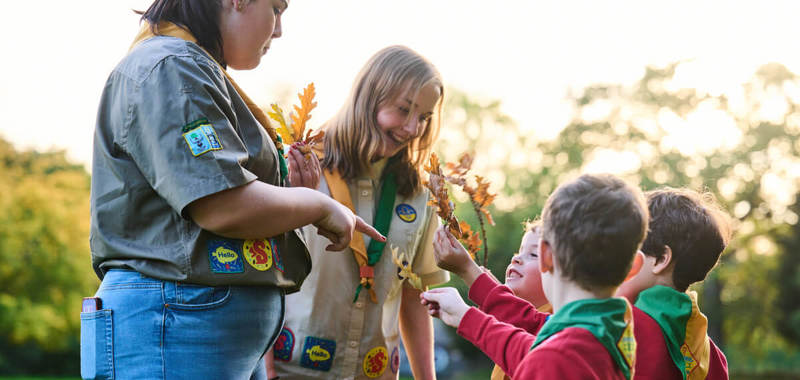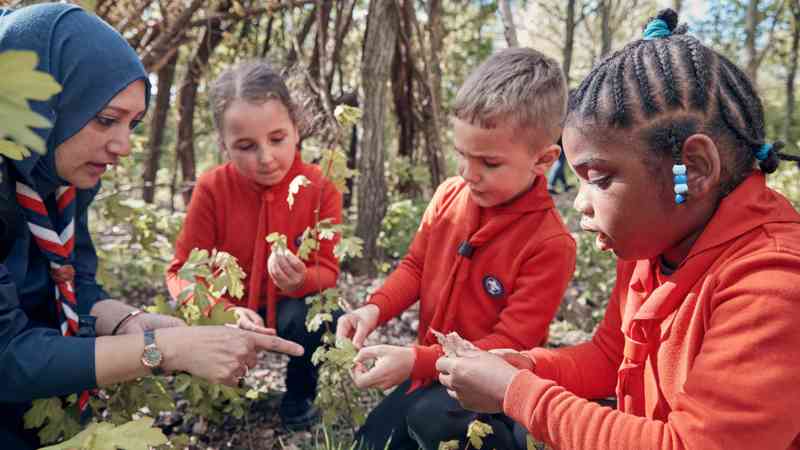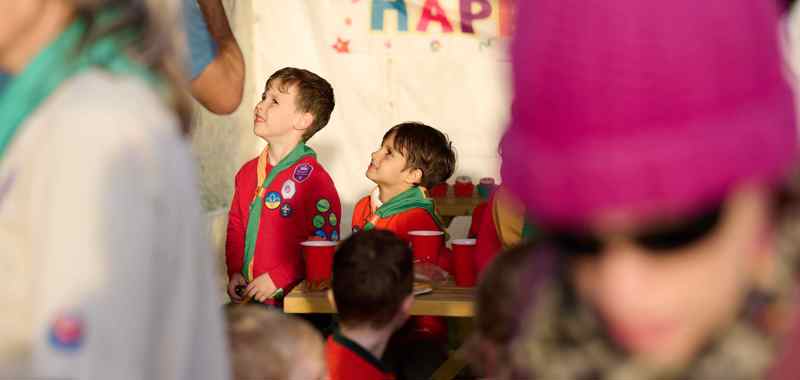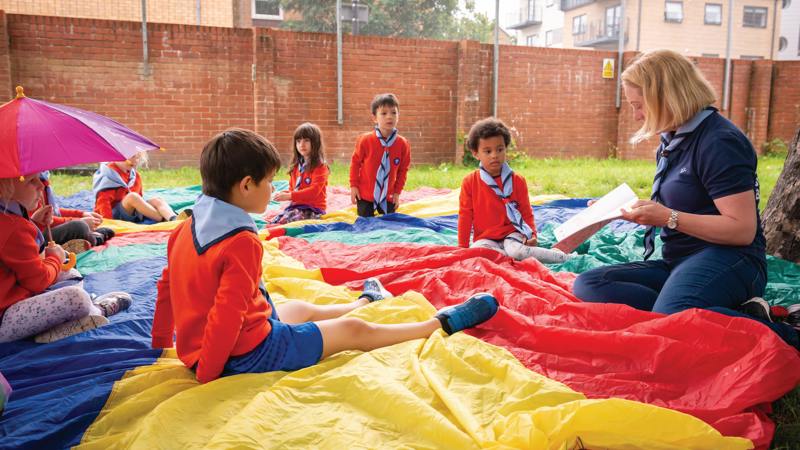Running the Squirrels programme
Running the Squirrels programme
Express your interest to open a Squirrels Drey
If you've decided that you'd like to start a new Squirrels Drey and have completed the readiness checklist, please complete this form to express your interest. This should be done by Group Scout Leaders and the District Commissioner will then carry out a final review.
Ensure you have read the readiness checklist before you complete this short formThe Squirrels programme
Fun, inclusive and grounded in teaching skills for life, the Squirrels programme has been specially developed for young people aged four and five years old. The meetings are grounded in teaching skills for life through practical, engaging and creative activities.
Squirrels are managed locally, with a maximum of 24 young people. Most Dreys meet on a weekday evening, with special events like days out scheduled throughout the year. Others might meet less frequently, or on the weekends, depending on local arrangements.
Each meeting lasts for around an hour, but this depends on your group. If you finish early, there are a number of team games you could run to get everyone working together and building skills for life. It's best to start the meeting with an active game to burn off some energy and get everyone ready for the activity. Games are time-dependent, if you think the activity will overrun you may want to start with the activity and have a game ready in case you have extra time.
Each meeting follows the same routine to support young people to feel confident during the session.
- Begin with an opening ceremony, where young people are welcomed into the group, self sign in and sing a song to start the meeting.
- Introduce the session with a story. This is an essential part of the Squirrel programme as literacy is incredibly important at this age.
- Get stuck into an activity – this makes up the bulk of your session and usually lasts around 20-30 minutes. The activity explores the theme of the session, as introduced by the story.
- Say goodbye with a closing ceremony. This is where everyone comes back together and shares their experience of the meeting in small groups or as a whole. Once the person running the meeting has shared the activity at home and any notices about the next session, the group sings the goodbye song to close the meeting.
Take it further. To build on the skills that young people have gained from the meeting, each meeting has an activity to do at home which can be found in the ‘take it further’ section of activity pages. These are completely optional but are incredibly beneficial to the young people and a great opportunity to discuss what they have been doing during the meetings with friends and family.
It's entirely up to you which meetings you want to run and in what order. Apart from the Kindness puppet show meetings (which are delivered in two parts), all meetings are stand-alone and can be completed in any order to give you as much flexibility as possible.
The story
The story in each meeting is a suggestion and can be changed for another story that is more readily available or for one that you feel better sets up the activity. You can find a whole host of books and which libraries have them available at WorldCat. The story is incredibly important to the meetings and the programme. If you do plan to swap it out for a different story check out the meeting outcomes to make sure the new story fits within these and relates to the meeting activity.
Thinking about your skills
Recognise yours and your team's own experiences and specialities. What can you, your adult and young leaders share to support the programme? You may wish to change/adapt some of the programme activities to reflect the groups’ interest at the time.
Special events
Celebrating special events throughout the year is important and a great opportunity to shake up the meetings. You may want to adapt the meeting to fit a special event, you could swap out the activity or game to instead design patterns on eggs to celebrate Easter or create paper lanterns to celebrate Diwali or Chinese lunar festival. In the Islamic calendar, Eid festival is celebrated by Muslims so you may wish to design Eid cards.
Whatever the festival or event that is taking place it is always good to reflect and mark these important occasions. All themes fit into any activity you may wish to adapt to. Even better, include the young peoples' thoughts and opinions when planning your programme. You will be surprised with what they have to offer.
To watch in full screen, double click the video
Tips for getting young people involved
During meetings, Squirrel Leaders are encouraged to enthusiastically support young people to participate in activities. Make sure your meetings run smoothly with these top tips.
The more you know about the young people, their likes, dislikes and what they feel confident getting involved in, the easier it is to tailor the meeting so that all the young people can be involved.
Young people aged four and five find it easier to pay attention and get involved in activities when they are in smaller groups. Smaller groups also encourage conversation among even the quietest young people.
Young people at this age struggle to follow long and complex instructions. Make sure you break down the instructions for what you are doing. Share the instructions where you plan to hold the activity and if you’re going outside, wait until you’re outside to explain the next stage. Otherwise, by the time you’ve moved to a new space, everyone will have forgotten the instructions.
When running an activity, show the young people how to complete the task step-by-step. If you can, work in small groups and support everyone to follow the instructions as you make or do the activity.
Learn more about visual aids and visual stories
Young Leaders are particularly well suited to explaining instructions and supporting children of this age. Make sure the Young Leader understands the task before starting and support them to deliver the task to a small group. This will help Young Leaders be the best that they can be.
Positive feedback’s incredibly important at this age. Celebrate mini goals throughout the meeting – a ‘Great colouring!’ or a ‘Well done for finding that’ will make a huge difference to a young person. Make sure that everyone gets praise when they do something well, and that it’s shared with the others.
Each story, game and activity has the opportunity for reflection. Make the most of these by regularly discussing what the young people have been achieving and relate it back to the meeting.
Take a break halfway through the meeting. This is a great time to provide the young people with a drink. Encourage them to either bring their own bottles filled up or provide them with a drink out of your own cups.
Quality Programme Checker
The Quality Programme Checker is a tool designed to help you to plan and review your programmes, and make sure that you're delivering quality Scouting to the young people that you work with.
This tool can be used by the Squirrel Leaders as an opportunity to reflect on the programme from the term or year. It uses a Red Amber Green (RAG) system in order to help identify successes, as well as any areas where the programme can be improved when planning your next programme. These categories have been calculated based on requirements for the older sections and may be adapted due to research on this section.
You could share your results with others in your Group or District, and discuss best practice and tips for improving the quality of your own and others programmes.
To help check that you’re providing the best Scouts experience possible to your young people, there’s also a training module on delivering a quality programme.
- More opportunities for outdoor and adventurous activities in safe environments
- Gaining confidence by participating in new or less familiar activities and stretching their comfort zones
- All young people regardless of their abilities, can enjoy and achieve
- Young people shape the programme based on what they want to learn and explore
- Ensuring the needs of every young person are met
- Responding to what young people are currently inquisitive about and reflecting this in the programme
- Developing skills for life, including teamwork and leadership
- Supporting young people with their progression through the sections
- Young people are excited about Scouting, having fun and increasing in confidence


For a quick and easy way to plan your Squirrels programme, use the programme planning tool.

To get you started with your Squirrels meetings, we’ve put together a ready-made programme that you can run for 15 weeks (a full term).

Looking for some inspiration to plan your Squirrels programme? Find Squirrels activity ideas for occasions and events throughout the year.

Storytelling’s an important part of Squirrels and is a highlight of the young person’s experience. So get some tips from Scouts and BookTrust on how to help everyone feel comfortable with storytelling.